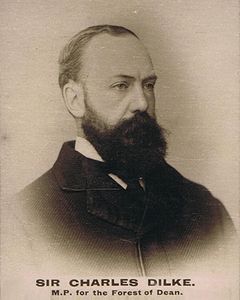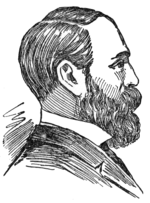- Sir Charles Dilke, 2nd Baronet
-
"Charles Dilke" redirects here. For other uses, see Charles Dilke (disambiguation).
Sir Charles Dilke, Bt
Image from an Ogden's Cigarette CardBorn 4 September 1843 Died 26 January 1911 Nationality British Education Trinity Hall, Cambridge Known for Liberal Party MP.
President of the Local Government Board., 1882 – 1885Spouse Emilia Strong (1840-1904) Sir Charles Wentworth Dilke, 2nd Baronet PC (4 September 1843 – 26 January 1911) was an English Liberal and reformist politician. Touted as a future prime minister, his aspirations to higher political office were effectively terminated in 1885, after a notorious and well-publicised divorce case.
Contents
Background and education
Dilke was the son of Sir Charles Dilke, 1st Baronet. He was educated at Westminster School and Trinity Hall, Cambridge, where he was President of the Cambridge Union Society.[1] His wife was the author, art historian, feminist and trade unionist Emilia, Lady Dilke.[2]
Political career, 1868-1886
Dilke became Liberal Member of Parliament for Chelsea in 1868, a seat he held until 1885. He was Under-Secretary of State for Foreign Affairs from 1880 to 1882 during Gladstone's second government and was admitted to the Privy Council in 1882. In December 1882 he entered the cabinet as President of the Local Government Board, serving until 1885. A leading and determined radical within the Liberal party, he negotiated the passage of the Third Reform Act, which the Conservatives allowed through the House of Lords in return for redistribution favourable to themselves (the granting of the vote to agricultural labourers threatened Conservative dominance of rural seats, but in return many double-member seats were abolished and seats redistributed to suburbia, where Conservative support was growing). He also supported laws giving the municipal franchise to women, legalising labour unions, improving working conditions and limiting working hours, as well as being one of the earliest campaigners for universal schooling.
The Crawford scandal
Dilke's younger brother Ashton Wentworth Dilke married May Eustace Smith, the eldest daughter of Thomas Eustace Smith in 1876. Sir Charles Dilke became Ellen's lover, a relationship which continued after his marriage in 1884. In July 1885, however, he was accused of seducing the Eustace Smiths' daughter Virginia in the first year of her marriage to Donald Crawford MP. This was supposed to have occurred in 1882 when Virginia was 19, and she claimed that the affair had continued on an irregular basis for the next two and a half years.
Crawford sued for divorce, and the case was heard on 12 February 1886 before The Hon. Mr Justice Butt in the Probate, Divorce and Admiralty Division. Virginia Crawford was not in court and the sole evidence was her husband's account of Virginia's confession. There were also some accounts by servants, which were both circumstantial and insubstantial. Dilke, aware of his vulnerability over the affair with Virginia's mother, refused to give evidence, largely on the advice of his confidante Joseph Chamberlain. Butt found – paradoxically – that Virginia had been guilty of adultery with Dilke, but that there was no admissible evidence to show that Dilke had been guilty of adultery with Virginia. He concluded, "I cannot see any case whatsoever against Sir Charles Dilke," dismissed Dilke from the suit with costs, and pronounced a decree nisi dissolving the Crawfords' marriage.[3]
The paradoxical finding left doubts hanging over Dilke's respectability, and investigative journalist William Thomas Stead launched a public campaign against him. Two months later, in April, Dilke sought to re-open the case and clear his name by making the Queen's Proctor a party to the case and opposing the decree absolute.[4] Unfortunately, Dilke and his legal team had badly miscalculated. Though they had planned to subject Virginia to a searching cross-examination, Dilke, having been dismissed from the case, had no locus standi. As a consequence it was Dilke who was subjected to severe scrutiny in the witness box by Henry Matthews. Matthews' attack was devastating and Dilke proved an unconvincing witness. His habit of physically cutting pieces out of his diary with scissors was held up to particular ridicule, as it created the impression that he had cut out evidence of potentially embarrassing appointments. The jury found that Virginia had presented the true version of the facts, and that the decree absolute should be granted.
Dilke was ruined. Other women claimed he had approached them for a liaison. Various lurid rumours circulated about his love-life, including that he had invited a maidservant to join himself and his lover in bed, and that he had introduced one or more of these to "every kind of French vice".[citation needed] For a time it seemed that he would be tried for perjury, although this did not eventuate.[3] The accusations had a devastating effect on his political career, leading eventually to the loss of his parliamentary seat (Chelsea) in the 1886 UK general election.[3] Matthews, on the other hand, gained public acclaim, winning the seat of Birmingham East as a Conservative at the same election. Queen Victoria, who approved of his performance in the trial, demanded that he be included in Lord Salisbury's cabinet, and he was made Home Secretary.
Dilke spent much of the remainder of his life and much of his fortune trying to exonerate himself, and this adds weight to the view that Virginia lied about the identity of her lover. Various men have been implicated over the years, including Archibald Primrose, 5th Earl of Rosebery and Chamberlain himself.[3]
Political career after 1886
Dilke later became MP for Forest of Dean in 1892, serving until his death in 1911. He had hoped to be appointed Secretary of State for War in the Liberal Government formed in 1905, but this was not to be.
Cultural references
Following his death, fund raising commenced to establish a local community hospital in his Forest of Dean constituency. The Dilke Memorial Hospital, Cinderford, opened its doors for the first time in 1923 and still exists as a permanent memorial to the popular M.P.
In the 1994 film Sirens, detailing sexual licence in Australia in the 1930s, the local pub is called the "Sir Charles Dilke".
Notes
- ^ Dilke, Charles in Venn, J. & J. A., Alumni Cantabrigienses, Cambridge University Press, 10 vols, 1922–1958.
- ^ Dictionary of Art historians: "Emilia, Lady Dilke"
- ^ a b c d Jenkins (2004)
- ^ Crawford v. Crawford and Dilke (The Queen's Proctor intervening) (1886) 11 PD 150
Bibliography
- Dilke, Charles Wentworth. (1868). Greater Britain. Macmillan (reissued by Cambridge University Press, 2009; ISBN 9781108003018)
- Gwynn, S. & Tuckwell, G. (1917). The life of the Rt. Hon. Sir Charles W. Dilke. London: John Murray. http://www.fullbooks.com/The-Life-of-the-Rt-Hon-Sir-Charles-W-Dilke.html.
- Jenkins, R (1996). Dilke: A Victorian tragedy. London: Papermac. ISBN 0-333-62020-8.
- — (2004) "Dilke, Sir Charles Wentworth, second baronet (1843–1911)", Oxford Dictionary of National Biography, Oxford University Press, accessed 24 November 2005 Subscription or UK public library membership required
External links
- Hansard 1803–2005: contributions in Parliament by Sir Charles Dilke
- The Rowers of Vanity Fair - Dilke, Charles Wentworth - “A Far Advanced Radical”
 Works written by Sir Charles Wentworth Dilke, 2nd baronet.
Works written by Sir Charles Wentworth Dilke, 2nd baronet.- Archival material relating to Sir Charles Dilke, 2nd Baronet listed at the UK National Register of Archives
Parliament of the United Kingdom New constituency Member of Parliament for Chelsea
1868 – 1886
With: Sir Henry Hoare, Bt 1868–1874
William Gordon 1874–1880
Joseph Firth Bottomley Firth 1880–1885Succeeded by
Charles Algernon WhitmorePreceded by
Godfrey Blundell SamuelsonMember of Parliament for Forest of Dean
1892–1911Succeeded by
Henry WebbPolitical offices Preceded by
Hon. Robert BourkeUnder-Secretary of State for Foreign Affairs
1880–1882Succeeded by
Lord Edmond FitzMauricePreceded by
John George DodsonPresident of the Local Government Board
1882–1885Succeeded by
Arthur BalfourAcademic offices Preceded by
Richard Biddulph MartinPresident of the Royal Statistical Society
1907–1909Succeeded by
Jervoise Athelstane BainesBaronetage of the United Kingdom Preceded by
Charles Wentworth DilkeBaronet
(of Sloane Street)
1869–1911Succeeded by
Charles Wentworth DilkeCategories:- 1843 births
- 1911 deaths
- Baronets in the Baronetage of the United Kingdom
- Members of the United Kingdom Parliament for English constituencies
- Political scandals in the United Kingdom
- Presidents of the Cambridge Union Society
- Liberal Party (UK) MPs
- Alumni of Trinity Hall, Cambridge
- Presidents of the Royal Statistical Society
- Old Westminsters
- UK MPs 1868–1874
- UK MPs 1874–1880
- UK MPs 1880–1885
- UK MPs 1895–1900
- UK MPs 1900–1906
- UK MPs 1906–1910
- UK MPs 1910
- UK MPs 1910–1918
Wikimedia Foundation. 2010.



